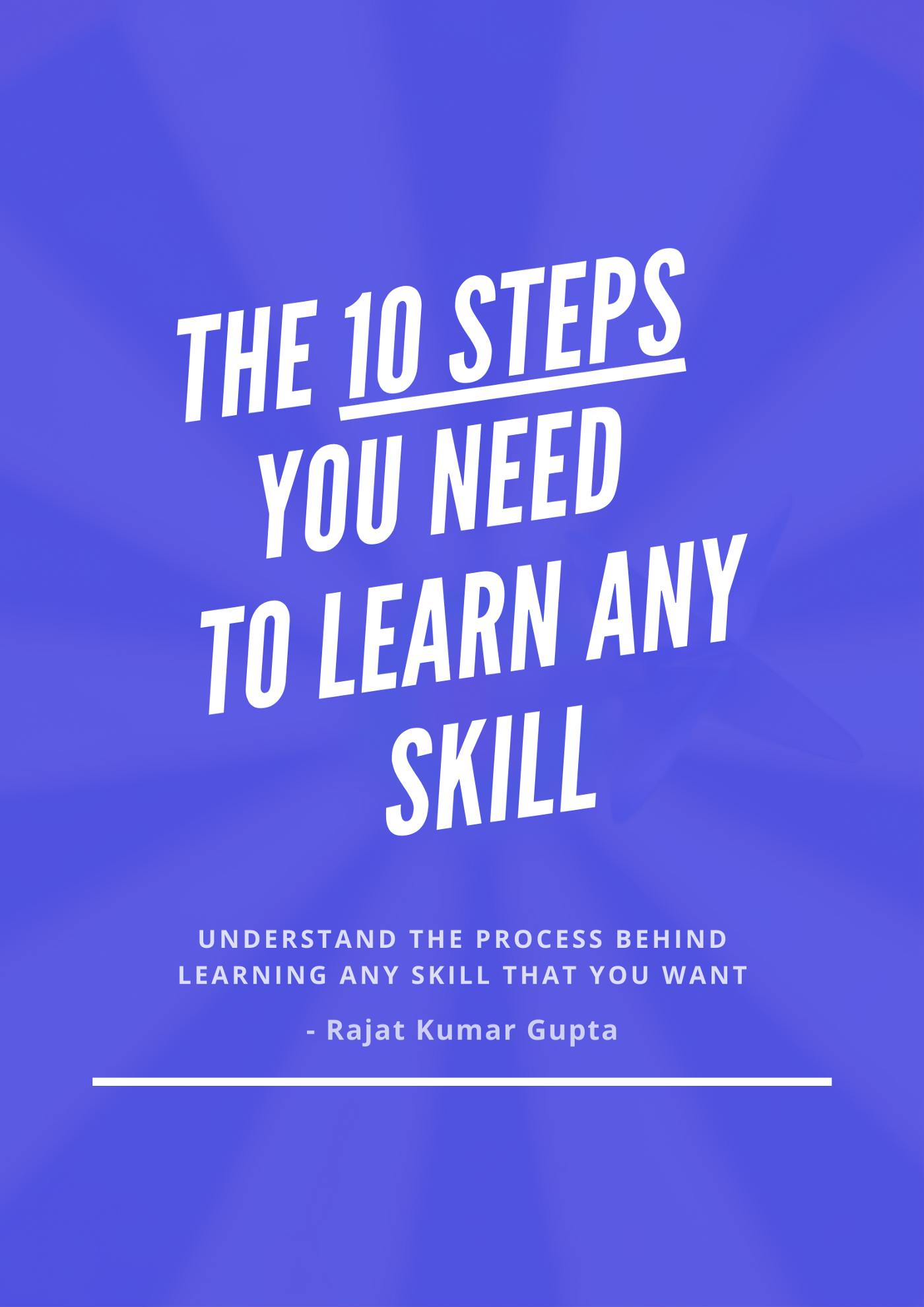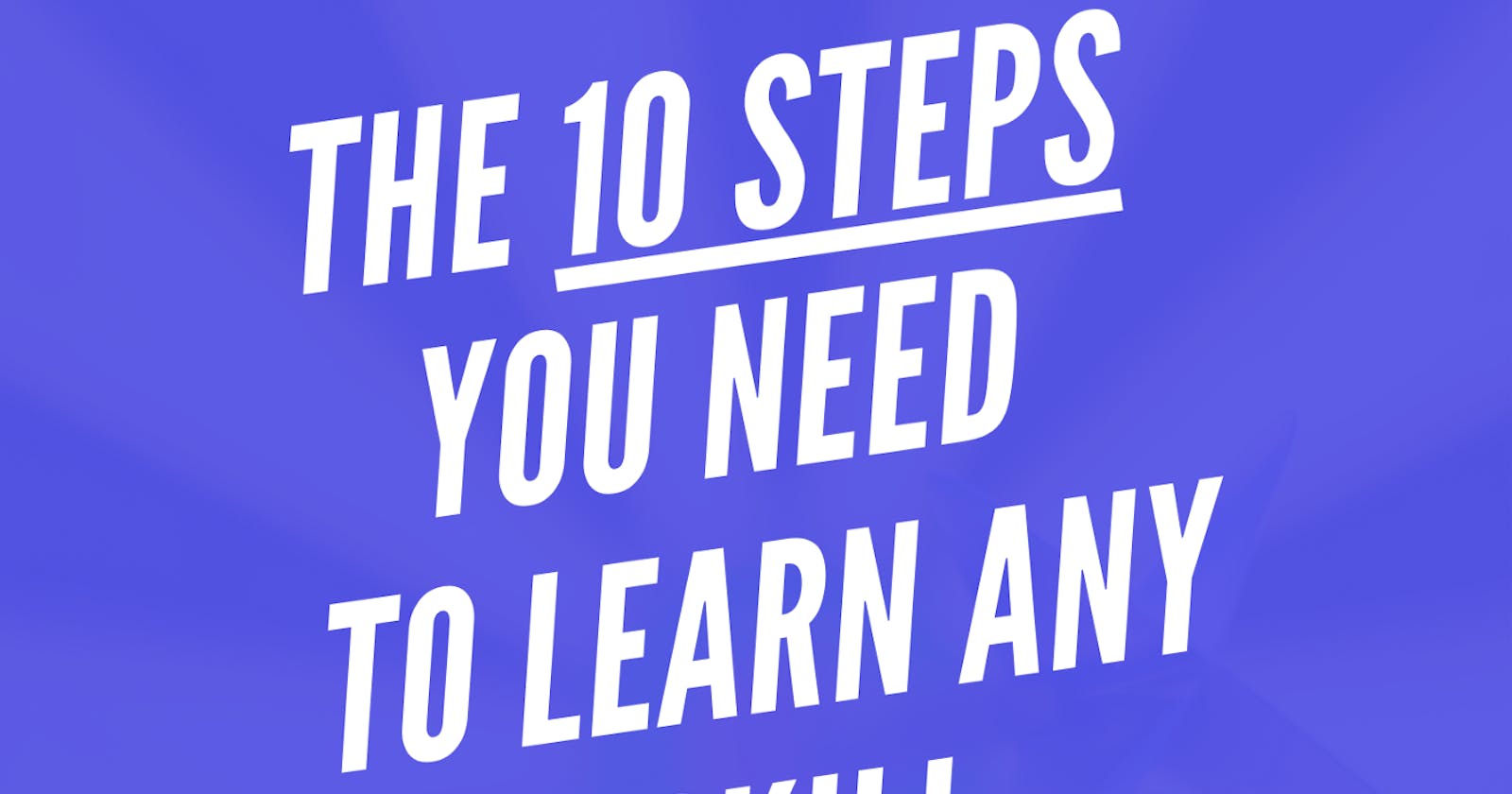 Over the last few years, I have been learning so many things online that I realized — I am unconsciously following a blueprint. So, I thought it will be a good idea to share this blueprint with the rest of the world.
Over the last few years, I have been learning so many things online that I realized — I am unconsciously following a blueprint. So, I thought it will be a good idea to share this blueprint with the rest of the world.
I have applied these steps to learn the following skills -
- Programming
- AR/VR
- Writing
- Speedcubing
- Video Editing
Here are the steps👇
Step 1: Write it down
Get a pen and paper. Write the skill that you want to learn and stick that paper on your wardrobe.
The idea behind sticking it on your wardrobe is that ideally, you will want to change your clothes every day on the way to college, office, or maybe hang out with friends and there is a high chance that your eyes will fall on that paper. Seeing that every day will keep you motivated towards the skill that you want to learn. You can stick that paper around your computer or anywhere in your workspace too. The important thing is that your eyes should fall on it.
You may even try using some wallpaper on your phone that keeps reminding you about the skill.
Step 2: Purpose
Alright, so you chose a skill. Now you want to learn it.
Well, why do you want to learn it?
Is it something that gives you peace?
Or is it something that you wish to make a career in?
Will it help you become more efficient in your current job?
Whatever it is. You need to write it down on that same piece of paper. Having a clear objective as to why you want to learn a skill will make sure that you stay on track and dedicate time towards learning the skill.
Learning a skill without any purpose won’t keep you motivated for long and you will eventually give up.
Even if your boss has told you to learn that skill, your purpose should be something like “learning this skill will keep my boss happy. Let’s do this!”
Step 3: Courses
Since now you have successfully identified the skill that you want to learn and even have a concrete reason behind learning that skill, you should start researching both online and offline for resources to learn the skill in a well-structured manner.
See if you can find any local agency or a teacher that can help you learn the skill. Nowadays, you can learn almost any skill online from the comfort of your home. Plus, with the internet and your smartphone, you can do this at your own pace.
There is a whole bunch of online courses available these days on platforms like Udacity, Coursera, EdX, Udemy, Skillshare, PluralSight, etc.
Step 4: Communities
You will find communities for any skill, anywhere in the world.
This is because you are not the only one who is interested in that skill and you will always find people who are interested in learning the same skill. Plus, you will also come across some experienced ones who can help you become better in the skill. If you are active on social media you will find a bunch of users and groups on LinkedIn, Twitter, Facebook, and Instagram. Most of them have internal groups on Discord, Slack, Telegram, and WhatsApp.
You can join these groups to stay updated with all the latest things happening in your field, sign up for networking events or resolve your personal queries related to whatever skill you are learning.
Stay positive and promote positivity in communities rather than engaging in pointless arguments and negativity.
Step 5: Setup your digital environment
Social media platforms like YouTube, Facebook, Instagram, Twitter, and LinkedIn are great at providing recommendations based on the kind of activities you do online.
So start liking posts related to the skill that you like.
Comment on them.
Share them with others.
This will automatically let the platforms give you recommendations related to your skill.
If you start sharing your own content, people will look up to you. Not only that, in the future when you become a master of the skill you may even start giving paid consultations and other services to generate a reliable source of income for yourself. On the way, you may even find free guides, free tickets to attend some events, and tons of stuff that you will only get to know once you become super active on social media.
As soon as you see a post related to your skill, hit the like button or comment what you think about it.
Step 6: Share your work
While you are learning something there is a high chance that you will make a few projects along the way.
Projects can mean many things here.
For instance, if you have picked up a guitar then you can post whatever you have learned to play in a week or two. Even if it is as simple as “Twinkle twinkle little star”.
Don’t be shy. Share it with the world.
Be proud of your little achievements.
Be humble and let them know you are trying to become better.
You don’t have to make a long well-edited YouTube video. Make a 10–20 seconds video, post it on Twitter and write a line or two on what challenges you faced while learning it. There is a high chance that others are having trouble learning something that you mastered in just one day. That is why sharing your trick or tips with them shows that you contributed something to the world. One day they will return the favor in unexpected ways.
Sharing is caring!
Step 7: Participate in challenges
Never miss a chance to take part in challenges or events. You need to understand your skill level and taking part in competitions helps a lot!
You don’t always have to win a challenge. You can go to such competitions to network with other people and learn from their experiences by approaching them and talking to them.
Communities and social media are a great way of staying up to date with such news and announcements. You might even be a part of a community that organizes such challenges and you can play the role of a volunteer to help the participants. Even if you lose a challenge you get to learn a lot from their experiences and work upon your shortcomings.
Step 8: Know the masters of your skill
No matter what skill you are learning you will always find a professional from whom you can learn furthermore.
Find a way to get in touch with them, talk to them, meet them or invite them to some event that your community is organizing.
You might find a few of them pretty active on social media. Ping them up. See if they respond. Masters of a particular skill are generally kind and happy to share their learnings with others. Ignore the grumpy and arrogant ones.
Step 9: Become a master yourself
At one point your learning will hit a plateau.
What I mean here is that you won’t understand how to grow further. You have sharpened your skill so much that you now need something else. That is the point from where you can continue practicing that same skill and see if you can generate a source of income. Here are some ideas —
- You can teach others.
- You can start a YouTube channel.
- You can have a website.
- You can write blogs.
- You can give private coaching to people who want to learn that skill.
- You can offer consultations.
- You can write your own book.
Take a look at that piece of paper that you stuck in the wardrobe earlier. If the purpose that you had written is served then you decide what to do next. Either you keep polishing your skill for the years to come or you start learning another skill.
Step 10: Commit
Commit to becoming a master of a skill or go for a new skill.
But how do you commit?
Set a time.
Observe the time required by others in your network to learn the skill that you have chosen.
- Commit to learning it within that time frame. At the end of the time frame, you will feel proud of how far you have come compared to when you started.
Conclusion
It’s fascinating how the above steps have been followed by everyone in various stages of life to achieve various levels of mastery. This blueprint adapts to so many other disciplines. Terminologies certainly differ but the general concept remains the same.

